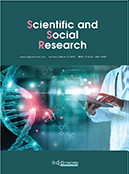Abstract
The article presents a comparative and typological study of A Song of Ice and Fire by G. Martin and Hard to Be a God by the Strugatsky brothers. These works are analyzed together with their screen versions. The purpose of the study is to reveal the typological (genre, plot, ideological, philosophical, and narrative) similarities of both works. The conducted research is relevant as the comparative and typological approaches help to understand the ideological and philosophical messages related to the role of an individual in history and the temptations for heroes endowed with supernatural power. This analysis is performed based on a combination of typological and comparative approaches: the comparative approach helps reveal deep similarities between these two works, and the typological approach helps comprehend their role in a wide cultural context. The conclusion is made that A Song of Ice and Fire and Hard to Be a God have several typologically close features. They belong to the genre of hybrid fantasy, they do not have a direct assessment of events, and there is no “all-competent” author’s point of view. Nevertheless, there is a metaphor of “an involved observer” who, nonetheless, is also limited in his possession of information. Both works represent a common psychological motivation of the heroes, which is based on a “mechanical” response to evil with more violent evil; a shift from the Christian tradition, atheistic and agnostic philosophizing are also represented in both works as well as a broken denouement and unresolved lines associated with the fate of the main characters. It should be noted that the works studied here belong to different historical and cultural epochs but they illustrate the development of typologically similar trends in literature and cinema, which are as follows: the strengthening of a pessimistic view of man and history, weakening of the spiritual and moral component, lack of assessment of the heroes’ actions, breakage (or inevitable absence) of denouement. The works of these authors are immensely popular because they satisfy the unspoken “social order,” and in some cases, they form it.
References
Komissarov VV, 2008, From Those Who Want the Strange to Degenerates: Transformation of the Image of the Intelligentsia in the Works of A. N. and B. N. Strugatsky. Intelligentsia and the World, 2008(3): 97–108.
Khrapchenko M, 1968, Typological Study of Literature and its Principles. Questions of Literature, 1968(2): 55–82.
Kozmina EJ, 2012, Genre Specificity of the Novel Hard to be a God by A. and B. Strugatsky. Bulletin of the Russian State Humanitarian University, 18(98): 100–107.
Piskunova L, Yankov I, 2020, The Narrative Structure and Postclassical Reality in George R. R. Martin’s Epic Fantasy Novels A Song of Ice and Fire and the Television Series Game of Thrones. Sociological Review, 19(1): 193–208.
Martin G, 2013, On Magic vs. Science, Weird Tales, https://web.archive.org/web/ 20130302174312
Nazarenko M, 2008, “Rage, Rage against the Dying of the Light…” Mikhail Nazarenko on the Creative Path of George Martin, 7Kingdoms, https://7kingdoms.ru/story/nazarenko-buntuj-umiraet-svet/
Martin G, 2000, Tuf Voyaging, AST, Moscow.
Strizhov AJ, 2014, Sacred and Ontological Evil in Strugatsky’s Novel “Hard to be a God” and the Eponymous A. German’s Film: The Question about Evolution of Human Values. Bulletin of the Nizhny Novgorod University, 2014(2–3): 314–316.
Strugatsky A, Strugatsky B, 2020, Hard to be a God, AST, Moscow.
Yakovleva SP, 2011, The Structure-Forming Function of Proper Names (Based on the Story of A. and B. Strugatsky “Hard to be a God”). Bulletin of Russian Pedagogical University, 130: 166–169.
Horn AK, 2020, Game of Thrones: Cultural Pessimism as a Recipe for Success. Sociological Review, 19(1): 183–192.
Panfilov F, 2014, Telemedievalism: Medieval TV Series in the Late 20th and Early 21st Centuries. Philosophical and Literary Journal “Logos,” 6(102): 193–208.
Ponomareva DV, 2018, The Omnipotent Powerlessness of Don Rumata: On the Specificity of the Interpretation of a Quixotic Situation in the Novel by A. and B. Strugatsky Hard to be a God. Philological Sciences. Questions of Theory and Practice, 1–2(79): 240–242.
Martin G, 2019, Dance with Dragons: Dreams and Dust, AST, Moscow.
Salnikova EV, 2018, From the Twin Peaks Screensaver to the Game of Thrones Screensaver. Evolution of the Mechanism. Art of Culture, 1(23): 238–259.
Gurevich AJ, 1984, Categories of Medieval Culture, AST, Moscow.
Fevr L, 1991, Fights for the History, Nauka, Moscow.
Losev AF, 2001, Dialectics of the Myth, Mysl’, Moscow.
?ndreeva GN, 2021, Trial and Justice in G. R. R. Martin’s Fantasy Novel, A Song of Ice and Fire. Bulletin of Cultural Studies, 2(97): 131–157. Lem S, 2020, The Star Diaries, AST, Moscow.
